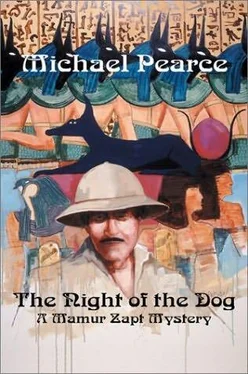Michael Pearce - The Mamur Zapt and the Night of the Dog
Здесь есть возможность читать онлайн «Michael Pearce - The Mamur Zapt and the Night of the Dog» — ознакомительный отрывок электронной книги совершенно бесплатно, а после прочтения отрывка купить полную версию. В некоторых случаях можно слушать аудио, скачать через торрент в формате fb2 и присутствует краткое содержание. Жанр: Исторический детектив, на английском языке. Описание произведения, (предисловие) а так же отзывы посетителей доступны на портале библиотеки ЛибКат.
- Название:The Mamur Zapt and the Night of the Dog
- Автор:
- Жанр:
- Год:неизвестен
- ISBN:нет данных
- Рейтинг книги:3 / 5. Голосов: 1
-
Избранное:Добавить в избранное
- Отзывы:
-
Ваша оценка:
- 60
- 1
- 2
- 3
- 4
- 5
The Mamur Zapt and the Night of the Dog: краткое содержание, описание и аннотация
Предлагаем к чтению аннотацию, описание, краткое содержание или предисловие (зависит от того, что написал сам автор книги «The Mamur Zapt and the Night of the Dog»). Если вы не нашли необходимую информацию о книге — напишите в комментариях, мы постараемся отыскать её.
The Mamur Zapt and the Night of the Dog — читать онлайн ознакомительный отрывок
Ниже представлен текст книги, разбитый по страницам. Система сохранения места последней прочитанной страницы, позволяет с удобством читать онлайн бесплатно книгу «The Mamur Zapt and the Night of the Dog», без необходимости каждый раз заново искать на чём Вы остановились. Поставьте закладку, и сможете в любой момент перейти на страницу, на которой закончили чтение.
Интервал:
Закладка:
Behind the carpet was a shallow recess in which the bedding was normally stored. When Georgiades and he were standing inside it and the carpet replaced, the wall looked like any other wall.
Sesostris came into the room.
“Well, Andrus?” they heard him say.
“Greetings, Sesostris,” Andrus said with difficulty.
“Why have you brought me here?”
“Because it is safest,” said Andrus, as they had agreed. “They are watching our houses. My house-and yours.”
“Mine?”
“They have found out. The Mamur Zapt knows.”
“What does he know? And how do you know that he knows?”
“I have a man in his office. Nikos.”
Owen winced. He thought that an unnecessary touch of Georgiades’s.
“He has told me.”
“How much does the Mamur Zapt know?”
“He knows about the money. And to whom it goes.”
“If he knows, why has he not moved?”
“To know is one thing. To be able to prove is another. That is why he is having the houses watched.”
“So he is not confident yet. Well, that is useful to know.”
Sesostris did not speak for some time. They heard him moving. He seemed to be walking up and down.
“It gives me a chance,” they heard him mutter, as much to himself as to Andrus. “The question is whether to stop now or go on.”
“I think we should stop, Sesostris,” Andrus squeaked uneasily. This part had not been in the script.
“It would be a pity to stop now, just when we are nearly there. A few more days, a week perhaps, would be sufficient. Two weeks at the outside.”
“The Mamur Zapt knows.”
“But cannot prove. Let us make sure that for the next two weeks he still cannot prove.”
“How can we do that?”
“We will not meet. I will get the money to you in some other way.”
“That is all right for you,” said Andrus with an unexpected flash of his old spirit, “but what about me? He knows I am the organization.”
“The church house is watched too?” Sesostris was silent for a moment. “Then you must move somewhere else,” he said with decision.
“They will find out.”
“But not at once. A week is all we need.”
“Is it so close?”
“The Khedive has to decide this week. While there is trouble between Copt and Moslem he cannot offer it to a Copt nor a Copt take it.”
“So he will have to offer it to someone other than Patros?”
“Yes.”
“That will be a Moslem,” said Andrus doubtfully.
“That suits us,” said Sesostris with extra definiteness.
“He will impose the levy.”
“And that suits us too. It is the only thing that will stir our sleeping brethren, the only thing that will make them fight and not cooperate. It is time,” said Sesostris, “to make a stand.”
“Yes,” said Andrus, with less than his usual certainty.
There was a little silence. Then Sesostris said:
“You are tired, old friend. It has been a hard battle and you have borne the brunt of it. Keep going for just a little longer and then I will have someone else take over.”
“I wish you had not given the money to the Moslems.”
“It was necessary. They would not have responded on such a scale otherwise. It had to be big, Andrus, for the Khedive to notice and be influenced.”
“But for them to use it against our own people!”
“It is hard, I know. But it was necessary. How else are we to break through the effects of centuries of compliance and make the Copts erect and independent once again?”
Again there was a silence. This time it was Andrus who broke it.
“Will there ever be an end to the trouble between Copts and Moslems?” he asked wearily.
“Yes. But on our terms.”
“I hope you are right. You play a dangerous game, Sesostris.” The two men talked for a little longer. Andrus was the first to leave. Owen waited, as he had agreed, until the door closed behind him. Then he stepped out from behind the hangings.
CHAPTER 13
The Moulid of the Sheikh el-Herera was peculiar among Moslem saint’s days in that its date was fixed not by the Moslem calendar but by the Coptic one. It always fell on Easter Monday. In the view of the Copts this was a deliberate attempt by the Moslems to borrow reflected glory from the greater spiritual event and to obfuscate its uniqueness. In the view of the Moslems the Christian feast was an irrelevance, pursued by the Copts with characteristically unhelpful enthusiasm in order to distract attention from the joyful celebration of the saint’s holy day and to clutter up the streets at the time of the Zeffa, or procession, in which the Moulid culminated.
What gave the day added piquancy was that it sometimes coincided, as it did this year, with yet another festival, that of the Sham el-Nessim, the old Egyptian spring festival, elements of which antedated both the Christian celebration and the Moslem one, and which called on the allegiance of all Egyptians whether Christian or Moslem or, indeed, anything else. In practice, the effect of all this was to blur the day into one of general celebration, and tension between Christian and Moslem only erupted into open conflict if things went badly wrong.
At the moment, fortunately, there was no sign of this happening. Everyone seemed in carnival mood. There were children everywhere, many of them dressed up in comic costumes and holding little red lamps. Every so often a few of them would form themselves into a line, each holding on to the coattails of the one in front, and then go burrowing through the crowds like snakes to the good-natured protests of the spectators.
The street-artists were out in force. Tumblers, acrobats, dancers, clowns, entertainers, wild men from the south, mixed with spectators and competed for their attention. As the evening wore on and the moment of the procession drew near, they were increasingly joined by small groups of Zikr, dancing and spinning in the light of the lurid, many-coloured lamps with which the streets were festooned.
Musicians were drumming on their tablas and darabukas, flutes were playing and fireworks cracking loudly. As they exploded they lit up for a moment the crowds with their excited faces, startling the donkeys in the donkey-vous and making the little horses stir uneasily. The few policemen on duty gawked heavenwards with the rest.
“It’s all quiet, at any rate,” said Paul, who had come with them to escort John Postlethwaite or, as he put it, “mark” him.
“Quiet?” said Jane Postlethwaite, her ears still ringing from the last explosion.
“In policing terms, that is,” said Paul, laughing. He turned to John Postlethwaite. “I don’t know if you were aware, sir, that there’s been a bit of trouble lately between the Copts and the Moslems. We were quite worried about that, you know, with Patros Pasha becoming Prime Minister.”
“A good man,” said John Postlethwaite, “a good financial head on him.”
“Yes. Well, in the run-up to the appointment there was quite a lot of tension. It broke out in the occasional incident between Copt and Moslem. Fortunately, Captain Owen has managed to get it under control.”
Owen knew that Paul meant to be helpful.
“You’d have your work cut out with this lot,” said John Postlethwaite, as a flock of dancing Zikr spiralled down the street holding flaming torches in their mouths, forcing the crowd to swirl and eddy unnervingly. “Religion, I take it.”
“What?” said Paul.
On the other side of the street Owen saw McPhee’s tall figure. McPhee was there, as he was, partly on purposes of pleasure. They both reckoned there would be no large-scale trouble that night. Small incidents there would certainly be, but both Andrus and Osman had honoured their undertakings and not only pulled their gangs off the streets but instructed them to avoid anything which could lead to trouble.
Читать дальшеИнтервал:
Закладка:
Похожие книги на «The Mamur Zapt and the Night of the Dog»
Представляем Вашему вниманию похожие книги на «The Mamur Zapt and the Night of the Dog» списком для выбора. Мы отобрали схожую по названию и смыслу литературу в надежде предоставить читателям больше вариантов отыскать новые, интересные, ещё непрочитанные произведения.
Обсуждение, отзывы о книге «The Mamur Zapt and the Night of the Dog» и просто собственные мнения читателей. Оставьте ваши комментарии, напишите, что Вы думаете о произведении, его смысле или главных героях. Укажите что конкретно понравилось, а что нет, и почему Вы так считаете.












